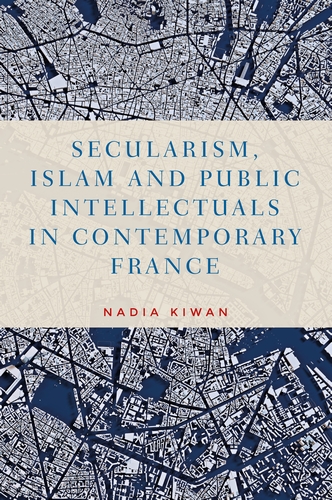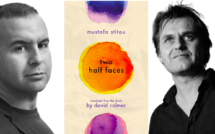
 Nadia Kiwan’s book, Secularism, Islam and Public Intellectuals in Contemporary France, addresses a topic that receives little attention in the social sciences: the position of Muslim intellectuals in France and their relationship to secularism. The interest of this work stretches beyond her object of study, and the problems she addresses speak to broader topics in preceding work on secularism and on the sociology of intellectuals. Kiwan’s goal is to shed light upon how knowledge production among secular Muslim intellectuals can be affected by hegemonic political discourses that casts Islam as contradictory to French values.
Nadia Kiwan’s book, Secularism, Islam and Public Intellectuals in Contemporary France, addresses a topic that receives little attention in the social sciences: the position of Muslim intellectuals in France and their relationship to secularism. The interest of this work stretches beyond her object of study, and the problems she addresses speak to broader topics in preceding work on secularism and on the sociology of intellectuals. Kiwan’s goal is to shed light upon how knowledge production among secular Muslim intellectuals can be affected by hegemonic political discourses that casts Islam as contradictory to French values.
Kiwan combines the study of secularism and the sociology of intellectuals in an original way. She describes how public debate in France addresses Islam along two main dimensions: the problem of the Islamic headscarf and the problem of Islamist violence. Unlike the dominant approach, Kiwan turns her attention to the intellectual world. To do so, she focuses on five public figures: Abdelwahab Meddeb (who passed away in 2014), a writer, poet, and radio-show host of Franco-Tunisian background who specialized in Sufism and taught comparative literature at Université Paris-X; Leila Babes, a professor of sociology of religion at Lille Catholic University; Malek Chebel (passed away in 2016), an Algerian anthropologist who authored works specializing in the Arab world and Islam; Dounia Bouzar, a French anthropologist and president of the Centre for the Prevention of Sectarian Excesses Related to Islam; and Abdennour Bidar, associate professor of philosophy and adviser (chargé de mission) on secular pedagogy at the French Ministry of National Education and High Council on Integration. Kiwan selected these five personalities for the influence they have in French debate on the topic of Muslims and Islam (12). Her concern in researching these intellectuals is directed towards the manner in which they negotiate their discourses about secularism. As such, each of them develops a critical project which aims to transform the religious practices of Muslims in France. They all take a stance on issues brought about by religious plurality.
Kiwan’s book thus undertakes the task of analyzing the intellectual output of these public figures while positioning it in the context of French debates on secularism. She uses the term secular Muslim intellectual to describe them, even speaking of the emergence of a specific field where they can voice their perspective (8). To describe them, Kiwan largely draws on the notion of Orientalism, developed by Edward Said. According to her, their approach is akin to the process of self-orientalization (14), meaning that secular Muslim intellectuals emphasize the education they have received in France as well as their Muslim culture. They benefit from being simultaneously insiders and outsiders to the Orient, asserting this double perspective in order to designate themselves as spokespeople for Muslim communities and as experts on Islam.
Kiwan also points to several constraints that underlie the perspectives of these Muslim intellectuals. She sees their viewpoints as reflecting an internalization of French republican principles (secularism, universalism, reason) (15). Using the framework of the Althusserian theory of ideology, the author sheds light on the extent to which the topic of secularism plays part in a hegemonic discourse which stigmatizes Muslims. The public debates surrounding islam such as those following the September 11 attacks and the Charlie Hebdo and Bataclan shooting, therefore, have had a significant impact on the stances adopted by secular Muslim intellectuals. Kiwan challenges the notion of intellectuals as being completely autonomous players, her goal being to understand the links between political power and the intellectuals as producers of ideas. For her, intellectuals are constrained in the stances they can adopt by the manner in which Islam is problematized in French public debate. Like the overall community of Muslims in France, they confront a narrative which views Islam as being an internal enemy (17). The assumed apprehension which is carried with this hegemonic attitude is clearly of an inhibiting character.
Throughout her analysis, Kiwan highlights the ways that this heteronymic framework shapes the discourse of Muslim intellectuals. She finds that, paradoxically, they do not carry out their traditional function as public intellectuals: “speak[ing] truth to power” (106). As an example, she notes how Meddeb claimed a double belonging to the Orient and to the West to express his perspective on Islam in France. This position of authority can also serve to marginalize those Muslims who refuse to publicly express their approval of secularism (50). Similarly, Kiwan finds that Bidar, in formulating his public stances, does not sufficiently challenge the French government’s stance about Islam (160).
In conclusion, the author offers several criticisms of the secular Muslim intellectual, viewing them as participants who contribute to the strength of the hegemonic view. According to her, they defend a consensus that is based on the values of the Enlightenment, universalism, and secularism. Kiwan seeks to explain the Muslim communities’ critical response to secular Muslim intellectuals by suggesting that it is based on the concessions they make to the hegemonic narratives. A paradox is thus created: to ensure their public existence, these intellectuals are expected to maintain a narrative that is aligned with the values of secularism; however, such a standpoint places them in conflict with Muslim communities. It would seem that this conclusion opens numerous opportunities for fruitful future analysis. I target three main areas of research inspired by the Kiwan observation. These avenues can help use to understand the critical reception of secular Muslim intellectuals by the members of their community.
The first line of research would be the project constituted by secular Muslim intellectuals with regards to Muslims’ religious practice. Wielding scientific knowledge, these intellectuals strive to substitute or to modify Islamic orthodoxy and orthopraxy. Such exercises seem to fall outside the scope of Muslims’ conception of religion. Whether they be a majority or a minority in a society, faithful Muslims experience their religion in a practical manner, but also as a tradition passed along from the elders. This discursive tradition (Asad 2009) is likewise a debate space which is far from being practiced with uniform orthodoxy. This tradition is shaped by varying debates about orthodoxies and orthopraxes. Considering such a framework, what would be the position of secular Muslim intellectuals inside this tradition?
The second area of future analysis is tied to the knowledge systems employed by secular Muslim intellectuals. They draw their inspiration chiefly from the philosophy of Western Enlightenment and consider “reason” to be their intellectual compass. Despite this, these intellectuals maintain approaches in which the religious texts play an important role. They stressed the incoherence of religious narratives relies on Muslim historical-religious accounts of the scriptures. These intellectuals do not express any radically anti-scriptural philosophies such as was the dominant tendency of Western Enlightenment. This paradoxical theoretical position seems to entail the isolation of these intellectuals in both Muslim and Western countries. With such conditions, how can they exist in the field of secular philosophy?
Lastly, it seems that the lukewarm reception of secular Muslim intellectuals can be explained by the fact that their methods are alien to the production of Islamic norms. Their primary interest is in contextualizing or in deconstructing the traditional Islamic narratives. As soon as they attempt to do this, they are confronted with unshakeable and non-negotiable convictions of other religious authorities, whose predetermined worldviews are incompatible with the promotion of new religious beliefs and the replacement of ones already enshrined (Roussillon 2007). The primary goal of these intellectuals is to develop Muslims’ critical thinking with respect to Islam. Such intent is antagonistic to the production of religious norms, which prevents these thinkers from being recognized as prescriptive references. Up to which point can the critical perspectives of secular Muslim intellectuals compete with those of religious authorities? Each of these future research topics derives from Kiwan’s keen observations deserves consideration both from a discursive point of view and from that of social practice.
Kiwan gives an extensive overview of French Muslim intellectuals in an original way. If one were to offer a critique of her book, it’s that secular Muslim intellectuals are not sufficiently viewed from the perspective of their publication networks. Indeed, it would be interesting to know which editors and journals allow them to sustain themselves in the intellectual field. Such matters will certainly be of concern for future studies, whose authors will find important and helpful content in Kiwan’s book.
Mohamed Amine Brahimi is Doctor of Sociology from the School for Advanced Studies in the Social Sciences (EHESS) in Paris. He is currently Visiting Fellow at Columbia University, Department of Sociology. His PhD thesis was written on the question of reform in contemporary Islamic thought. He has published on topics related to the sociology of intellectuals, post-colonial theory and Islamic thought. His published work includes studies on Mohamed Arkoun (“Elective affinity as an intellectual connection: A Review of Mohammed Arkoun’s relation to the Institute of Ismaili Studies (IIS),” International Journal of Politics, Culture, and Society, 2018) , the French reception of Edward Said (“The Controversial Receptions of Edward Said: A Sociological Analysis of Scientific Citations,” Sociologica, 2017, with Clarisse Fordant) and Tariq Ramadan’s intellectual trajectory (‘’Strategies of a transnational intellectual: Tariq Ramadan and the project of a European Islam,” Sociological review, 2020, with Thomas Brisson).
Secularism, Islam and Public Intellectuals in Contemporary France
By Nadia Kiwan
Publisher: Manchester University Press
Hardcover / 192 pages / 2019
ISBN: 978-1-7849-9412-9
References:
Asad, Talal. 2009. “The Idea of an Anthropology of Islam.” Qui Parle 17 (2): 1–30.
Roussillon, Alain. 2005. La pensée islamique contemporaine: acteurs et enjeux. Paris: Téraèdre.
Published on September 17, 2020.




